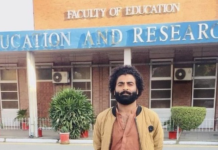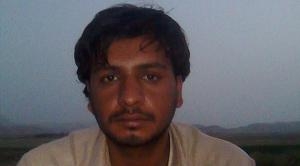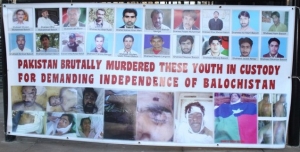London: A representative of International Voice for Baloch Missing Persons attended the 11th International Symposium against Isolation at Amsterdam convened on January 25 and 26. The IVBMP (UK) coordinator Faiz Baluch talked about Balochistan’s history, its occupation by the British and subsequent division by drawing two arbitrary line without the consent of Baloch people.He also told the audience that Pakistan occupied Balochistan declared its independence on 11 August 1947 but Pakistan attacked and occupied it on 27 March 1948. He said since then Pakistan has carried out five major military operations in Baluchistan to crush the Baluch liberation movement. These military operations were in 1948, 1958, 1962, 1973-77 and the year 2000 which is still continuing. Thousands of people were killed during each of these operations; hundreds of thousands were expelled from their ancestral land. The displaced people fled to neighboring countries including Afghanistan and Gulf states. He said that since the beginning of the new wave of military operations in 2000, Pakistani forces abducted more than 18000 Baloch activists including women and children. 1500 among these people have already been killed in custody and their bodies found dumped in desolated area across Balochistan. Human Rights Organizations describe this heinous act as the “Kill and Dump” policy of the state forces in Balochistan. He said: “The main target of disappearances and kill & dump policies are well educated Baloch youth including students, teachers, university professors, lawyers, poets, singers and other members of Baloch society. Their ages vary from 10 year old kids to 85 year old men and women.”He said several Baloch singers were abducted by state forces and some sort of chemical was poured down their throat depriving them from singing forever whereas many Baloch singers have been killed under-custody by Pakistani forces. He said: “To draw the world’s attention, Voice for Baloch Missing Persons (VBMP), an Organisation comprising of the family members of abducted and murdered Baloch have been struggling peacefully. “They submitted petitions to Pakistani courts, met countless authorities, have gone on hunger strike and have kept a picket continuously for 1355. But, no body heard their plea – now they are on a more than 3000 kilometer long march which started on 27 October last year and still continues.”He said that the Baloch families are marching from Quetta, capital of Balochistan to Islamabad, the Capital of Pakistan. “They have walked for 72 days so far and cover more than half of the distance. This historic and peaceful has been completely ignored by the mainstream media of Pakistan. The international media also turned a blind eye to this long march because they mostly rely of state media.” Briefly highlighting some of the latest incidents Faiz Baluch said that on 13 January Para-military forces attacked a college in Balochistan – and confiscated hundreds of books – which included works of Bertrand Russell, biographies of Mahatma Gandhi, Nelson Mandela and Che Guevara. The books seized by Pakistani forces also included Balochi language, poetry and history of Balochistan. He said Jihadi literature is allowed and openly sold in markets in Pakistan but Baloch students were not even allowed to read books about philosophy, history and literature. He said two mass graves were discovered in Tootak area of Khuzdar in Balochistan on Saturday and Sunday respectively containing at least 75 dead bodies. “The Voice for Baloch Missing Persons leaders said that these bodies are of the previously abducted Baloch activists,” he added.At the end of his speech Faiz Baluch also played a videos clip of #VBMPLongMarch to show the participants that how difficult it was for the Baloch marchers but they were determined to continue their march for release of their loves ones and thousands of other Baloch. He suggested to organisers of the conference to pass resolutions to support the VBMP Long march, condemn Balochistan genocide by Pakistan and Iran and support the Baloch people’s struggle for national liberation. Human rights activists, lawyers and journalists from Germany, Switzerland, Latin America, Middle East, Ireland, UK and several other countries also spoke at the conference.






